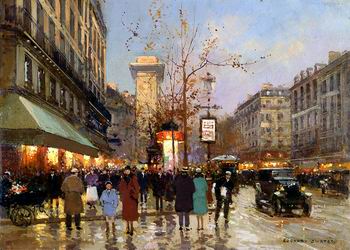Is a Country’s Decline First Inward, Self-Imposed?
 American broadcasting pioneer William L. Shirer bore unique witness to Europe in the 1930s in his memoir 20th Century Journey, The Nightmare Years, 1930-1940. Workng for CBS, he and Edward R. Murrow were almost insiders as the continent wound itself up for World War II.
American broadcasting pioneer William L. Shirer bore unique witness to Europe in the 1930s in his memoir 20th Century Journey, The Nightmare Years, 1930-1940. Workng for CBS, he and Edward R. Murrow were almost insiders as the continent wound itself up for World War II.
Arriving as a journalist in the mid-twenties, Shirer saw a vibrant culture in all the European cities that was intellectually healthy and inwardly happy. Paris (picture) was a mecca for those who sought immersion in the creative life:
The French, as well as visiting or resident foreigners, especially Americans, still saw it as the City of Light, the cultural capital of the world, the most beautiful metropolis ever built. Life bustled in it. The theaters, concert halls, cabarets, restaurants, cafes were crowded. Prices were reasonable. The art museum and galleries attracted great throngs. Books poured from the presses and were bought and read. No city in the world had so many bookstores nor so many—and so lively—literary and art reviews. No other provided so much intellectual and artistic excitement.
But it wasn’t just the Great Depression that made all the difference. The people themselves seemed to have lost a joy about life that wasn’t even acknowledged to themselves. Politicians from every country became lazy and confused, looking more to their own self-interests and careers than to the commonweal.
Do bad leaders come along to cheapen and destroy a culture, or is it the opposite? Do people first lose their identity and purposes, then invite in the worst politicians? Shirer didn’t blame politicians like Chamberlain or Hitler so much as a spiritual loss within the people:
“How shoddy it has become in the last ten years!” I exclaimed in my diary. Some of my French friends agreed. They would point to the neon signs, the gaudy movie palaces, the huge automobiles sales windows, the cheap bars, which had begun to dominate the Champs Elysees, and say “That is what America is doing to us.” But I thought that that was what France was doing to herself. The country, it struck me sadly, had lost something she had fourteen years before when I had first arrived in Paris: her taste, part of her soul, the sense of her historical and cultural mission.
 American broadcasting pioneer William L. Shirer bore unique witness to Europe in the 1930s in his memoir 20th Century Journey, The Nightmare Years, 1930-1940. Workng for CBS, he and Edward R. Murrow were almost insiders as the continent wound itself up for World War II.
American broadcasting pioneer William L. Shirer bore unique witness to Europe in the 1930s in his memoir 20th Century Journey, The Nightmare Years, 1930-1940. Workng for CBS, he and Edward R. Murrow were almost insiders as the continent wound itself up for World War II.